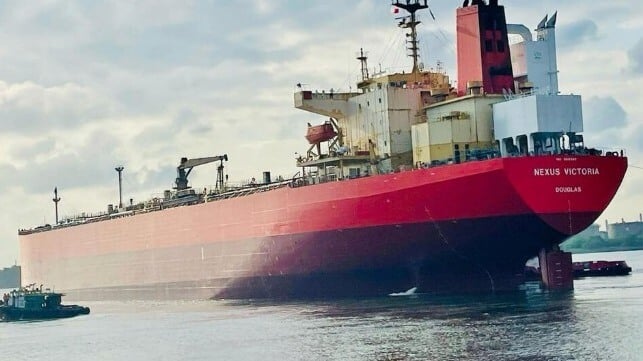Study Quantifies Net GHG Emissions Savings From Onboard Carbon Capture

The Global Centre for Maritime Decarbonisation (GCMD) based in Singapore released what it believes is the first comprehensive study looking at the emissions savings and costs associated with the use of onboard carbon capture and storage systems. The center notes that while life cycle assessments are available for onshore carbon capture technologies, assessments of the overall GHG emissions from deploying these solutions onboard vessels across the associated value chains are limited. It hopes the results of its new study will provide shipowners with valuable information as they consider incorporating the technology into their planning.
The study, named COLOSSUS (Carbon capture, offloading, onshore storage, utilization, and permanent storage), provides an in-depth analysis of GHG emissions and costs associated with OCCS across the entire carbon value chain, accounting for emissions from fuel production, transport, and use, to CO2 capture onboard the vessel and its final disposition. The study explored five OCCS technologies, with six marine fuel options, and three post-capture scenarios.
The key findings illustrated some encouraging potential for ship owners with for example a base finding of a 29 percent savings well-to-wake in GHG emissions for a vessel burning heavy fuel oil (HFO) using the most developed of the OCCS technologies (monoethanolamine (MEA)-based OCCS). This is considered to be the most mature of the technologies.
The savings can be expanded by replacing HFO with biofuels. For example, bio-LNG and biodiesel from used cooking oil combined with OCCS they found could produce reductions of 69 to 121 percent well-to-wake.
Among the post-capture scenarios evaluated, using the captured CO2 in concrete they reported is most effective. This approach can increase GHG emissions savings from 29 to 60 percent across the carbon value chain by partially displacing the need for carbon-intensive cement in applications ashore. Captured CO2 they also reported can be used to produce e-methanol with renewable electricity, allowing the vessel that consumes this e-methanol to claim a 17 percent GHG emissions savings.
Post-capture transport and permanent storage of CO2 they also reported add minimal emissions, approximately 1 percent to the WtW emissions of a vessel deploying MEA-based OCCS when the captured CO2 is transported 1,000 km. They also concluded that the cost of avoided carbon for OCCS with permanent storage is between $269 to $405/tCO2 for a 40 percent gross capture on an MR tanker.
The results also show a potential pathway for extending the economic life of current in-service vessels. They highlight that an HFO-fueled ship adopting MEA-based OCCS at 40 percent gross capture can, on a WtW basis, maintain an equivalent GFI below the direct compliance target until 2032. Similarly, LNG-fueled ships equipped with the same OCCS can maintain an equivalent GFI below the direct compliance target until 2035. Further, when fossil fuels are completely replaced by their bio-counterparts, OCCS can lower the GFI enough for the ship to be compliant with the more stringent 2040 targets.
“As we face an increasing array of decarbonization solutions spanning different industries and value chains, coupled with the challenges of quantifying and elucidating carbon flows from source to sink including its re-use, there is a pressing need for a comparable means to understand their net abatement impact,” said Professor Lynn Loo, CEO of GCMD. “We hope this LCA (life cycle assessment) study for OCCS provides a foundation for the comprehensive understanding needed to shape robust regulatory frameworks surrounding OCCS and supports decision makers in making informed, value chain-based decisions.”
The Center notes that while the recently articulated GHG Fuel Intensity (GFI) framework does not explicitly specify how emissions reduction from OCCS is taken into consideration, they believe the study offers a structured basis for assessing the solution’s potential in helping shipowners and operators manage their emissions' portfolio.
